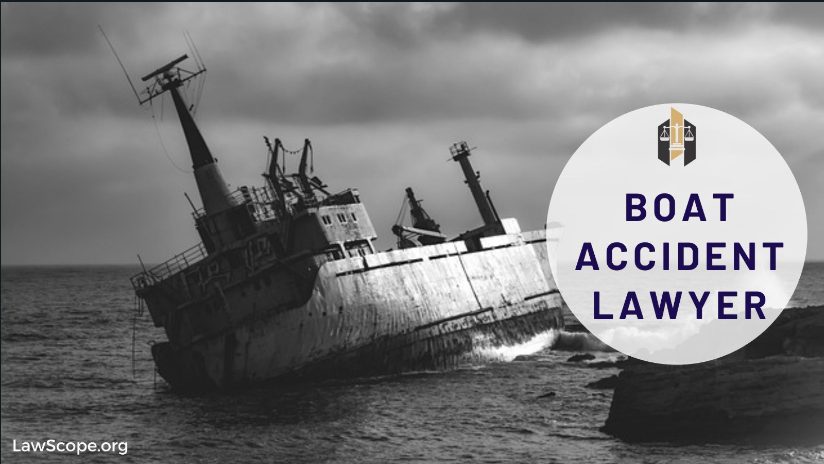Boating is a fun and exciting activity, but it can also be dangerous if proper safety measures are not taken. Boating accidents can cause severe injuries, property damage, and even death. If you or a loved one has been involved in a boating accident, you may be entitled to compensation. In such a situation, a boat accident lawyer can be of great help.
Who is a Boat Accident Lawyer?
A boat accident lawyer is a legal professional who specializes in representing clients who have been involved in boating accidents.
They are experts in maritime law, which is a specific area of law that deals with navigation and shipping. A boat accident lawyer can help you navigate the legal process and ensure that you receive fair compensation for your injuries and damages.
1. Earn a Bachelor’s Degree
The first step to becoming a boat accident lawyer is to earn a bachelor’s degree in any field. While there is no specific major required for law school admission, it’s recommended to choose a major that will help develop skills that are relevant to the legal profession, such as critical thinking, analytical reasoning, and communication.
2. Take the LSAT
The Law School Admission Test (LSAT) is a standardized test that is required for admission to law school. The test measures skills such as reading comprehension, analytical reasoning, and logical reasoning. A good score on the LSAT can improve your chances of getting accepted into a top law school.
3. Attend Law School
After earning a bachelor’s degree and taking the LSAT, the next step is to attend law school. Law school typically takes three years to complete and involves courses such as contracts, torts, civil procedure, and criminal law. During law school, it’s recommended to take courses related to maritime law and boating accidents to gain a better understanding of the field.
4. Pass the Bar Exam
After graduating from law school, the next step is to pass the bar exam in the state where you intend to practice. The bar exam is a comprehensive exam that tests your knowledge of the law and your ability to apply it to real-world scenarios. Each state has its own bar exam, so it’s important to research the requirements for the state where you plan to practice.
5. Gain Experience in Maritime Law
To become a successful boat accident lawyer, it’s important to gain experience in maritime law. This can be done by working for a law firm that specializes in maritime law or by taking on cases related to boating accidents. Experience in maritime law will help you develop the skills and knowledge needed to navigate complex legal issues related to boating accidents.
6. Build a Network
Networking is important in any field, and the legal profession is no exception. Building a network of contacts in the legal community can help you find job opportunities, gain referrals for new clients, and stay up-to-date on the latest legal trends and developments.
7. Pursue Continuing Education
To stay up-to-date on changes in the law and new developments in the field of maritime law, it’s important to pursue continuing education. This can be done through attending seminars, taking online courses, or participating in professional organizations related to maritime law.
Becoming a boat accident lawyer requires a combination of education, experience, and networking. By following these steps, you can develop the skills and knowledge needed to succeed in this challenging and rewarding field.
Why Do You Need a Boat Accident Lawyer?
Boating accidents can be complex and involve multiple parties. Determining liability in a boating accident can be challenging, especially if there are multiple vessels involved.
A boat accident lawyer can investigate the accident, gather evidence, and identify the responsible party. They can also negotiate with insurance companies and other parties to ensure that you receive fair compensation.
A boat accident lawyer can also help you with the legal process. They can file a lawsuit on your behalf, represent you in court, and ensure that your rights are protected. If you try to handle the legal process on your own, you may miss important deadlines or make mistakes that could harm your case.
What Can a Boat Accident Lawyer Do for You?
1. Investigate the Accident
The first thing a boat accident lawyer will do is investigate the accident. They will gather evidence such as witness statements, accident reports, and photos. They will also evaluate the damages and determine the cause of the accident. This information is crucial in determining liability and ensuring that you receive fair compensation.
2. Identifying the Party Responsible
Determining liability in a boating accident can be challenging, especially if multiple parties are involved. A boat accident lawyer can help you identify the responsible party or parties. They will analyze the evidence and determine who was at fault for the accident. This can be the boat operator, the boat manufacturer, or another party.
3. Negotiating with Insurance Companies
Insurance companies are often involved in boating accident cases. A boat accident lawyer can negotiate with insurance companies on your behalf.
They can ensure that you receive fair compensation for your injuries and damages. If an insurance company is unwilling to provide fair compensation, a boat accident lawyer can file a lawsuit to ensure that your rights are protected.
4. File a Lawsuit
If negotiations with insurance companies are unsuccessful, a boat accident lawyer can file a lawsuit on your behalf. They can represent you in court and ensure that your rights are protected. A boat accident lawyer can also help you understand the legal process and what to expect.
5. Ensure You Receive Fair Compensation
The main goal of a boat accident lawyer is to ensure that you receive fair compensation for your injuries and damages. They will work tirelessly to negotiate with insurance companies or represent you in court to ensure that you receive fair compensation. This can include compensation for medical expenses, lost wages, property damage, and pain and suffering.
6. Provide Legal Counsel and Guidance
A boat accident lawyer can provide you with legal counsel and guidance throughout the entire legal process. They can help you understand your legal rights and options, advise you on the best course of action, and answer any questions you may have.
7. Handle Insurance Claims
Dealing with insurance companies after a boating accident can be a complicated process. A boat accident lawyer can handle all insurance claims on your behalf, including negotiating with insurance adjusters and ensuring that you receive a fair settlement.
8. Prove Liability and Damages
A boat accident lawyer can use their expertise to investigate and gather evidence to prove liability and damages. They can consult with expert witnesses, such as accident reconstruction specialists and medical professionals, to strengthen your case.
9. Ensure Compliance with Maritime Law
Maritime law is complex and has its own set of rules and regulations. A boat accident lawyer can ensure that your case complies with all relevant maritime laws and regulations and that your rights are protected under the law.
10. Help You Avoid Costly Mistakes
Navigating the legal process on your own can be overwhelming, especially if you are dealing with injuries and property damage. A boat accident lawyer can help you avoid costly mistakes, such as missing important deadlines, failing to gather key evidence, or accepting a settlement offer that is lower than what you are entitled to.
11. Represent You in Court
If your case goes to court, a boat accident lawyer can represent you and advocate on your behalf. They can present your case to a judge and jury, cross-examine witnesses, and argue on your behalf.
12. Provide Emotional Support
Boating accidents can be traumatic and emotionally taxing. A boat accident lawyer can provide you with emotional support and help you cope with the aftermath of the accident. They can offer guidance and resources to help you manage your physical and emotional recovery.
Conclusion
A boat accident lawyer can provide you with a wide range of services, including investigating the accident, identifying the responsible party, negotiating with insurance companies, filing a lawsuit, and ensuring that you receive fair compensation.
They can also provide you with legal counsel and guidance, handle insurance claims, prove liability and damages, ensure compliance with maritime law, help you avoid costly mistakes, represent you in court, and provide emotional support.
If you or a loved one has been involved in a boating accident, seeking the help of a boat accident lawyer can make all the difference in the outcome of your case.
You May Like Also:





Leave a Reply